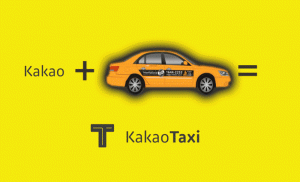TPG to buy stake in Korea’s taxi hailing app for $437 mn
Jun 30, 2017 (Gmt+09:00)
2
Min read
Most Read
LG Chem to sell water filter business to Glenwood PE for $692 million


Kyobo Life poised to buy Japan’s SBI Group-owned savings bank


KT&G eyes overseas M&A after rejecting activist fund's offer


StockX in merger talks with Naver’s online reseller Kream


Mirae Asset to be named Korea Post’s core real estate fund operator


TPG will buy about a 30% stake in South Korea’s top taxi-hailing and chauffeur services provider for 500 billion won ($437 million), in its first deal to secure in the country in over a decade as the Korean start-up firm is seeking overseas expansion to counter falling profits.
The US-based private equity firm is to sign the share purchase agreement soon for the mobility business unit of Kakao Corp., South Korea’s largest messaging service company.

“We only need to fine-tune our contract as the size and value of the stake sale were already determined,” a source in the selling side of the transaction told the Korean Investors on June 29. “We will sign the agreement by no later than early next week.”
Kakao, which merged with the country’s second-largest Internet portal Daum in 2014, recently spun off its mobility business, Kakao Mobility.
The mobility business had 15 million subscribers for the taxi-calling service in the country with a 50 million population at end-June.
The share transaction, involving new shares, comes after TPG invested $258 million in the US ride-sharing service provider Uber, together with Google Ventures, in 2013.
It will be its first investment in South Korea since Sanghoon Lee, a former Morgan Stanley executive, joined TPG last August to lead its Korean operations.
Japanese financial services firm Orix Corporation and Korea Investment Partners Co. Ltd. will also invest less than 100 billion won together in the spun-off unit of Kakao.
Kakao expects the non-controlling stake sale to TPG to help finance its business expansion beyond the home market.
Since launched in 2015, the smartphone taxi-hailing application connects the subscribers with 224,000 taxi drivers registered as its members. Its users call taxies as many as 1.5 million times a day.
The free-of-charge service for taxi drivers and users has been edging out traditional cab-calling service companies in South Korea where Uber has suspended services due to regulatory hurdles.
Its chauffeur service, launched last year, had 2.2 million subscribers at end-February.
But net profits of Kakao Corp. tumbled in the past two years to less than half of its 2014 earnings, hit by poor mobile advertisement sales.
Kakao Mobility plans to unveil new fee-charging services, including car parking and premium services, in the second half of this year.
By Hugh YH Jeong
hugh@hankyung.com
The US-based private equity firm is to sign the share purchase agreement soon for the mobility business unit of Kakao Corp., South Korea’s largest messaging service company.

“We only need to fine-tune our contract as the size and value of the stake sale were already determined,” a source in the selling side of the transaction told the Korean Investors on June 29. “We will sign the agreement by no later than early next week.”
Kakao, which merged with the country’s second-largest Internet portal Daum in 2014, recently spun off its mobility business, Kakao Mobility.
The mobility business had 15 million subscribers for the taxi-calling service in the country with a 50 million population at end-June.
The share transaction, involving new shares, comes after TPG invested $258 million in the US ride-sharing service provider Uber, together with Google Ventures, in 2013.
It will be its first investment in South Korea since Sanghoon Lee, a former Morgan Stanley executive, joined TPG last August to lead its Korean operations.
Japanese financial services firm Orix Corporation and Korea Investment Partners Co. Ltd. will also invest less than 100 billion won together in the spun-off unit of Kakao.
Kakao expects the non-controlling stake sale to TPG to help finance its business expansion beyond the home market.
Since launched in 2015, the smartphone taxi-hailing application connects the subscribers with 224,000 taxi drivers registered as its members. Its users call taxies as many as 1.5 million times a day.
The free-of-charge service for taxi drivers and users has been edging out traditional cab-calling service companies in South Korea where Uber has suspended services due to regulatory hurdles.
Its chauffeur service, launched last year, had 2.2 million subscribers at end-February.
But net profits of Kakao Corp. tumbled in the past two years to less than half of its 2014 earnings, hit by poor mobile advertisement sales.
Kakao Mobility plans to unveil new fee-charging services, including car parking and premium services, in the second half of this year.
By Hugh YH Jeong
hugh@hankyung.com
Yeonhee Kim edited this article
More to Read
-
 Real estateMirae Asset to be named Korea Post’s core real estate fund operator
Real estateMirae Asset to be named Korea Post’s core real estate fund operatorApr 29, 2025 (Gmt+09:00)
-
 Asset managementMirae Asset bets on China as Korean investors’ US focus draws concern
Asset managementMirae Asset bets on China as Korean investors’ US focus draws concernApr 27, 2025 (Gmt+09:00)
-
 Alternative investmentsMeritz backs half of ex-manager’s $210 mn hedge fund
Alternative investmentsMeritz backs half of ex-manager’s $210 mn hedge fundApr 23, 2025 (Gmt+09:00)
-
 Real estateRitz-Carlton to return to Seoul, tapped by IGIS Asset for landmark project
Real estateRitz-Carlton to return to Seoul, tapped by IGIS Asset for landmark projectApr 22, 2025 (Gmt+09:00)
-
 Real estateS.Korean gaming giant Netmarble eyes headquarters building sale
Real estateS.Korean gaming giant Netmarble eyes headquarters building saleApr 18, 2025 (Gmt+09:00)
Comment 0
LOG IN


